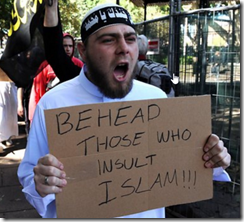 There is a constant effort to build a rhetorical chasm between Islam and Radical Islam in our world. Many would have you believe that there is no connection between the terror toting Muslims and their holy texts or religious heritage. Such a claim is spurious as best. Without making a extensive case here, let’s leave it at this: You can certainly find verses in the Koran and anecdotes from the history of Mohammed’s life to support such an approach to Islam. It is at the very least one reasonable interpretation of their sacred text and the historical record of their faith.
There is a constant effort to build a rhetorical chasm between Islam and Radical Islam in our world. Many would have you believe that there is no connection between the terror toting Muslims and their holy texts or religious heritage. Such a claim is spurious as best. Without making a extensive case here, let’s leave it at this: You can certainly find verses in the Koran and anecdotes from the history of Mohammed’s life to support such an approach to Islam. It is at the very least one reasonable interpretation of their sacred text and the historical record of their faith.
By why do those seeking to make the gap between Islam and Radical Islam so large care so much? What stake do they have in protecting Islam since most of them are not Muslims? It could be argued that they simply seek to protect peace-loving Muslims from false accusations or persecution. And no doubt, there is something to be said for this. But I think there is something more here.
Our world wants to divide all those who practice religion into two camps, radical and moderate. In their eyes, the distinction between the two may have many facets but none more important than the ones brought forth by these questions: Does the believer feel compelled to share their beliefs with others? Do they believe their beliefs to be universally true for all people? Moderate believers keep their beliefs to themselves and practice their faith privately. Radical believers are compelled to share their beliefs even publicly.
Our modern world is quite fine with people holding any personal belief so long as they do not believe it must be held as true by anyone else. Postmodernism loves plurality of belief.
Many Christians are actively participating in building the rhetorical chasm between moderate and radical elements of the Islamic faith. And no doubt there is a great difference between the two that must be recognized, especially in some public debates.
But we need to take a step back to see the wider narrative that is being sold. It is this: radical believers (defined by the world) are bad and need to be destroyed. Moderate believers should be allowed to go on their way as long as their way never crosses someone else’s way.
We may rejoice when this logic is applied to Muslims, feeling ourselves both hounds of justice against the radicals and peacefully tolerant doves towards the moderates.
But we must know this. Many in our world feel the same way about us Christians. Moderate Christians willing to put aside the practices the current culture has deemed outdated or uncivilized are welcomed. Radical Christians who insist that we must hold true to the faith once confessed by the apostles and handed down to us by the Church are looked at as extreme. And ultimately they will insist that such Christians be silenced. They will say that such extreme beliefs can only lead to violence pointing back to Islam to make their case.
True religion is not moderate. It is in one sense radical by its very nature. A religious person who lets go of tenets of their faith easily is not true adherent of that religion. And so, the real question is this: What does the religion we are talking about truly confess? Are the most radically committed followers of a religion bringing forth good or evil?
So be careful today when you try to make the case that the radical Muslims are not to be viewed as valid representatives of their religion. For next, the same measure will be placed upon you. You will be dismissed as not a true Christian. The only adherents of religion allowed to speak will be those who have departed from the heritage of their historic faiths. And that will be to the world’s detriment.
